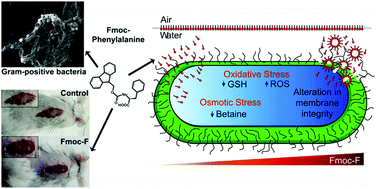Fmoc-phenylalanine displays antibacterial activity against Gram-positive bacteria in gel and solution phases†
Abstract
In the quest for new antimicrobial materials, hydrogels of Fmoc-protected peptides and amino acids have gained momentum due to their ease of synthesis and cost effectiveness; however, their repertoire is currently limited, and the mechanistic details of their function are not well understood. Herein, we report the antibacterial activity of the hydrogel and solution phases of Fmoc-phenylalanine (Fmoc-F) against a variety of Gram-positive bacteria including methicillin-resistant Staphylococcus aureus (MRSA). Fmoc-F, a small molecule hydrogelator, reduces the bacterial load both in vitro and in the skin wound infections of mice. The antibacterial activity of Fmoc-F is predominantly due to its release from the hydrogel. Fmoc-F shows surfactant-like properties with critical micelle concentration nearly equivalent to its minimum bactericidal concentration. Similar to Fmoc-F, some Fmoc-conjugated amino acids (Fmoc-AA) have also shown antibacterial effects that are linearly correlated with their surfactant properties. At low concentrations, where Fmoc-F does not form micelles, it inhibits bacterial growth by entering the cell and reducing the glutathione levels. However, at higher concentrations, Fmoc-F triggers oxidative and osmotic stress and, alters the membrane permeabilization and integrity, which kills Gram-positive bacteria. Herein, we proposed the use of the Fmoc-F hydrogel and its solution for several biomedical applications. This study will open up new avenues to enhance the repertoire of Fmoc-AA to act as antimicrobial agents and improve their structure–activity relationship.



 Please wait while we load your content...
Please wait while we load your content...